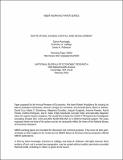Institutions, Human Capital, and Development
Author(s)
Acemoglu, Daron; Gallego, Francisco A.; Robinson, James A.
DownloadAcemoglu_Institutions human.pdf (570.1Kb)
OPEN_ACCESS_POLICY
Open Access Policy
Creative Commons Attribution-Noncommercial-Share Alike
Terms of use
Metadata
Show full item recordAbstract
In this article, we revisit the relationship among institutions, human capital, and development. We argue that empirical models that treat institutions and human capital as exogenous are misspecified, both because of the usual omitted variable bias problems and because of differential measurement error in these variables, and that this misspecification is at the root of the very large returns of human capital, about four to five times greater than that implied by micro (Mincerian) estimates, found in the previous literature. Using cross-country and cross-regional regressions, we show that when we focus on historically determined differences in human capital and control for the effect of institutions, the impact of institutions on long-run development is robust, whereas the estimates of the effect of human capital are much diminished and become consistent with micro estimates. Using historical and cross-country regression evidence, we also show that there is no support for the view that differences in the human capital endowments of early European colonists have been a major factor in the subsequent institutional development of former colonies.
Date issued
2014-08Department
Massachusetts Institute of Technology. Department of EconomicsJournal
Annual Review of Economics
Publisher
Annual Reviews
Citation
Acemoglu, Daron, Francisco A. Gallego, and James A. Robinson. “ Institutions, Human Capital, and Development.” Annual Review of Economics 6, no. 1 (August 2014): 875–912.
Version: Original manuscript
Other identifiers
NBER Working Paper 19933
ISSN
1941-1383
1941-1391